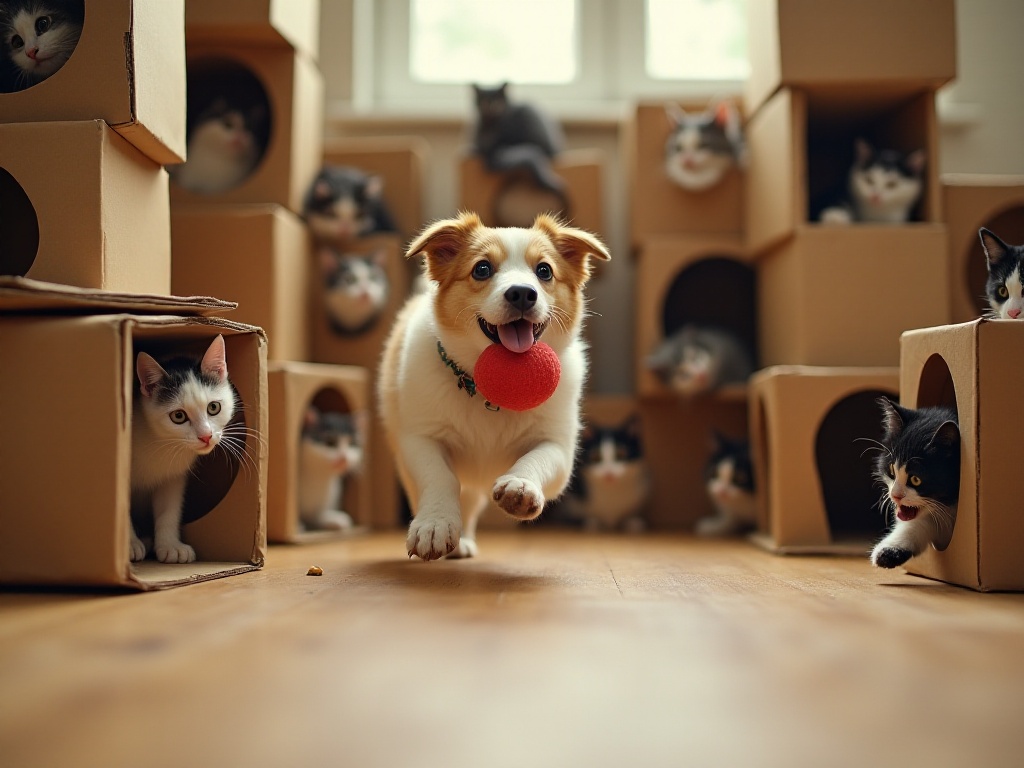Opening Words
Have you just adopted an adorable puppy? Or are you considering getting one? As someone who has been a dog owner for 7 years, I deeply understand that overwhelming feeling when you first become a pet parent. To be honest, I was completely clueless at the beginning, not even sure about basic feeding. But after years of hands-on experience, I've finally compiled a set of practical dog-care tips. Let me share them with you to help you avoid common pitfalls - after all, those lessons learned shouldn't go to waste, right?
Scientific Feeding
When it comes to raising dogs, feeding is the most fundamental issue. When I first started, I thought the more my dog ate, the better, and I was delighted to see them eating heartily. Whenever they looked at me with those big puppy eyes, I couldn't resist giving them more food. Until one vet check-up, when the doctor seriously warned: "If you continue feeding like this, your dog will develop diabetes." This incident taught me an important lesson about the significance of scientific feeding.
Dog nutrition is actually quite particular, not just about feeding them whatever you buy. First, you need to choose high-quality dog food. I know there's a lot of cheap dog food on the market, but they often contain large amounts of starch and additives that can affect your dog's health long-term. From personal experience, my Golden Retriever developed skin allergies from cheap dog food, constantly scratching until they lost a lot of fur. The veterinary treatment alone cost nearly 3,000 yuan, which made me realize that saving money on dog food really isn't worth it.
When selecting dog food, I recommend checking the ingredients list - protein content should be above 20%, and fat content between 8-15% is appropriate. Many imported dog foods now have AAFCO certification, which is generally reliable. Though the price isn't cheap - my dog's food costs over 500 yuan monthly. But considering it's their daily staple, and we humans care about balanced nutrition ourselves, why shouldn't we do the same for our dogs?
Can dogs eat human food? I've been asked this countless times. During walks, I often encounter neighbors wanting to feed my dog snacks, making it awkward to refuse. The answer is: yes, but with extreme caution. According to the American Veterinary Association, over 100,000 dogs are poisoned annually from consuming inappropriate human food. Chocolate, grapes, onions, and garlic are absolute no-nos. Chocolate contains theobromine, which can cause rapid heartbeat and even death in dogs. Grapes and raisins are particularly mysterious - scientists still haven't figured out exactly why, but they can cause acute kidney failure in dogs.
Regarding feeding, another crucial point is maintaining a fixed feeding schedule. I feed my dog three meals daily at 7 AM, 2 PM, and 8 PM, without fail. It was challenging at first, especially when wanting to sleep in on weekends, but dogs have very accurate biological clocks. Now I don't even need an alarm - they'll come to remind me when it's time.
Water is also essential - fresh drinking water should always be available. I place water bowls in different areas of the house so they can drink wherever they are. In summer, I add mint leaves to the water, making it more refreshing and preventing bad breath.
Then there's the treat issue. Honestly, it's hard to resist giving treats when they look at you with those expectant eyes. But treats must be strictly controlled, and it's best to choose dog-specific treats. I keep beef jerky, chicken jerky, and dental chews on hand. These treats not only satisfy their snacking desires but also help clean their teeth. Remember, treats shouldn't exceed 10% of their daily caloric intake.
While feeding, it's important to observe any changes in appetite. Sudden loss or increase in appetite could signal health issues. Once my dog suddenly lost interest in their favorite food, and we later discovered it was gastroenteritis - fortunately caught early.

Health Management
Did you know that dogs are excellent "actors"? They often mask illness - it's their natural instinct. In the wild, showing weakness would make them prey, so they try to appear normal even when sick. By the time they show obvious symptoms, the condition might be serious. Like when my dog appeared perfectly energetic, but a check-up revealed severely elevated liver enzymes.
That's why regular check-ups are crucial. I recommend at least two check-ups annually, with puppies and senior dogs potentially needing more frequent visits. Many veterinary hospitals offer check-up packages including blood work, biochemistry panels, and ultrasounds, ranging from 300-800 yuan. While it seems expensive, data shows over 60% of diseases can be detected and treated early through regular check-ups. Last year, my dog's check-up revealed tartar buildup - catching it early meant a simple cleaning solved the problem. Any later, and tooth extraction might have been necessary.
Speaking of teeth, this is often overlooked. Many think dogs don't need tooth brushing, but dental health is incredibly important. Dogs might resist brushing at first. I suggest building the habit early, starting with finger-massaging their gums using dog toothpaste, then transitioning to a toothbrush. Now my dog cooperates well with brushing, knowing there's a reward afterward.
Vaccination is another health priority. Puppies need timely core vaccines including distemper, parvovirus, and rabies. These vaccines might seem expensive, totaling several hundred yuan, but consider the cost of treating these diseases. Moreover, diseases like rabies don't just threaten dogs' lives but can also infect humans.
Deworming is essential, both internal and external. External deworming prevents fleas and mites - I use monthly spot-on treatments. Internal deworming prevents worms, needed every 3-6 months depending on age and environment. While these products aren't cheap, they're more economical than treating infestations.
Exercise requirements are often overlooked. Different breeds need different amounts of exercise. Large breeds like Golden Retrievers and Huskies need at least 1-2 hours daily, while small breeds like Yorkshire Terriers might need just 30 minutes. Regardless of breed, daily exercise is essential. I take my dog to a nearby park daily, and to dog parks on weekends for socializing. Insufficient exercise can lead to obesity, joint problems, and even affect their mood, making them irritable.
Regarding exercise, summer heat requires special attention to prevent heatstroke. Unlike humans who cool down by sweating, dogs regulate temperature through panting. Avoid exercising during peak sun hours in summer, preferring cooler morning or evening times. If you notice excessive panting or purple tongue, immediately stop exercising, find shade, and provide water.
[To be continued, remaining content will be sent in parts due to length limitations]
Related articles




